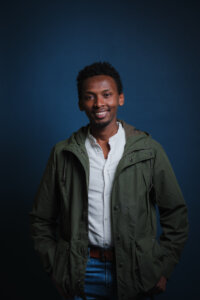I was fired from CNN for antisemitic tweets. How do I make amends?
My teenage comments were abhorrent. Yet the context in which I made them is important to understand

Graphic by iStock
It’s a catchy news story: “CNN producer professes support for #teamhitler and terror group Hamas.” I would click on it, as I’m sure many of you would.
On Nov. 13, 2022, I worked on a story about the Israeli elections. After it was published, a pro-Israel media watchdog called HonestReporting dug deep into my tweets and found two abhorrent ones from July 2014.
In 2014, I was a teenager living in the slums of Nairobi, Kenya. In one of the tweets, speaking about the World Cup, I declared myself a supporter for Germany and wrote that I was “#teamhitler.” In the other, I described Hamas as “modern day freedom fighters.”
I now find these tweets completely abhorrent and unacceptable. I wrote them at a time when I lacked crucial information about the Holocaust and the world at large.
These harmful messages written in the immaturity of youth have now been weaponized against me. The same day that I co-authored the article on Israeli elections, HonestReporting launched an intense online campaign accusing me of being anti-Jewish and presenting “lopsided media coverage” of the Middle East, which led to my being dismissed from my job at CNN.
The group didn’t reach out to me for comment, attempt to learn the context of the situation or give me the chance to respond. They gave no thought to a possible evolution as a person I had gone through since 2014, and they charged me as an antisemite. I am morally compelled to make amends for the harmful tweets of my immature youth, yet the haste with which I was judged leaves no room for my personal context, nor grace.
HonestReporting, according to their website, “analyzes stories, articles, opinion pieces and images that appear in the media’s coverage of Israel, exposing and responding to inaccuracies or bias.” They called for my firing from CNN, and the network complied after mounting pressure online.
What HonestReporting missed were the realities in which these tweets were sent out. As a young person living in one of Kenya’s poorest slums, I was not exposed to historical events like the Holocaust. I was born and raised in Nairobi in the slum of Korogocho, where my mother was a refugee from Ethiopia and my father was Kenyan and Somali. In Kenya, if you are poor you hope for a way out through education, as the alternative for many kids is to turn to crime. All of my early education was received in public schools, where the combination of a ballooning student population and limited funding meant there weren’t enough teachers for the number of students, let alone enough to cover important topics.
In high school history class, we learned briefly about our own history of colonization and World War II, but the focus was more about paying tribute to the African soldiers who fought in the “white war.” Access to quality education by children from the slums is usually impossible, and while my parents encouraged me to read and write from an early age, that wasn’t the case for a lot of my friends. Even as the world welcomed the internet and introduced computers to schools, kids like me fell far behind.
My upbringing was filled with poverty and hardships, and I had limited knowledge of global events outside of my own experiences. Unfortunately, this lack of understanding led me to tweet ignorantly about certain historical events. Had I been more properly educated and aware of these contexts, I would not have tweeted such things. I wish that HonestReporting had taken these factors into consideration before damaging my reputation.
From the slums to CNN
I grew up as a devoted Muslim, and my parents always taught me to be peaceful, loving, and compassionate toward people of all faiths. Tragically, my father was murdered while working as a security guard when I was 16. This event motivated me to pursue a career in journalism. In younger democracies like Kenya’s, journalism is the foundation of social change, and I believed I could help pursue justice in this type of work.
I aggressively applied for internships with Kenyan news stations and worked my way up from an intern to a fixer to a producer, all while attending the United States International University in Nairobi. After graduation, I had the opportunity to freelance for CNN and was accepted to pursue a master’s degree at UC Berkeley’s Graduate School of Journalism, and I moved to the United States in the spring of 2021. I received several fellowships and awards, and my thesis focused on a community in Minneapolis that had a history of racial segregation and inequality but also showed deep resilience and strength as they overcame struggles.
After graduation, I accepted a dream job at CNN as a news desk producer on the international desk. In this role, I wrote stories from all over the world and had the chance to learn snippets of different cultures and countries as a global producer.
This lasted until I contributed to the piece about Israeli elections last fall.
Over the past two months, I sought forgiveness through a public statement on Twitter. I took time to reflect on the gravity of what I had tweeted nearly 10 years ago and reached out to my Jewish friends.
It was only in graduate school in California that I met the first Jewish person in my life, and I grew to have many Jewish friends with whom I shared meals and long conversations. I reached out to figures in the Minnesota Jewish community where I have been living for the past few months, and even to contacts in the Israeli consulate in Atlanta in an attempt to apologize and clear my name.
I don’t hate Jews. I do not support antisemitism, nor do I wish harm upon Jewish people. I unequivocally condemn Hitler and Hamas, and I don’t condone violence nor show solidarity for any political ideology that resorts to violence. I am passionate about advocating for human rights, as is evidenced by most of the stories I’ve reported in my career, and I do feel deep empathy for the Palestinian people. Unfortunately, at the time of my tweet, I had a minimal understanding of what Hamas stood for.
I am committed to learning more about forgiveness in both the Jewish and Muslim faiths, and I want to fully perform teshuvah by confessing to my tweets, expressing my deep regret, and making sure I am never misguided again.
We live in a world where the internet has both helped and hurt us. While it’s convenient to connect with others and access information, it’s also a place where fake news and bullying thrive. The social media algorithms reward impulsive fast takes, and context is absent. Cancel culture may have begun as an attempt for marginalized people to speak the truth to power. However, it is often those people with less power who suffer the most consequences, while those with power can get away with harmful actions.
HonestReporting did not reach out to me at any point. I am curious what about the relatively banal article on Israeli elections that I co-authored got their attention in the first place, ultimately provoking a deep dive into my Twitter account that unearthed the antisemitic tweets. I wonder if they investigated my co-authors for evidence of anti-Jewish bias, or if they simply chose the writer with a visibly Muslim name.
I am clear on what my path of teshuvah looks like in the days and months ahead. I know that my process of making amends and repairing the damage I caused will not be easy. I honestly do not blame CNN for terminating my employment.
I only wonder about HonestReporting and other outlets that capitalize on salacious clicks without context, that mete out punishment without grace. Who does this type of judgment serve, and is this what journalism’s pursuit of justice looks like?
To contact the author, email [email protected]
Correction: The original version of this article incorrectly stated the organizations that HonestReporting called for the author to be fired or removed from. The Association of Foreign Press Correspondents in the USA was contacted by HonestReporting regarding the author’s tweets, but was not asked to rescind the author’s scholarship. The Berkeley Center for Human Rights’ leadership has no record of anyone seeking to rescind the author’s fellowship.
























